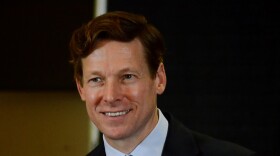Updated at 3:45 p.m.
The UNC-Chapel Hill Board of Trustees has proposed a resolution to address and offer guidance on discrimination — or preferential treatment — in hiring, contracting or admissions based on an applicant’s race, sex, color, ethnicity, or national origin.
The resolution lacks details on how any hiring and admissions efforts will be affected, but it appears to target affirmative action practices the university might use to conduct recruitment of minority students, faculty, staff or contractors.
The board's audit committee approved the resolution Wednesday. Committee chair Marty Kotis said the board wants to ensure the university is following the recent U.S. Supreme Court decision overturning affirmative action in a case involving UNC-Chapel Hill.
“It's my understanding from discussions with various board members that we do wish to ensure compliance,” Kotis said. “And so this is a step in that direction.”
The resolution uses grand terms, citing the U.S. Constitution, North Carolina Constitution, and references to diversity, equity and inclusion in the UNC policy manual. The resolution also cites a UNC-Chapel Hill policy granting the trustees responsibility for oversight as an advisor to the chancellor regarding management of the university.
The university’s chief audit officer Dean Weber said Kotis reached out to him to discuss “the management of DEI risks and asked me to consider how [the internal audit department] could potentially support an independent assessment of activities within these spaces.”
Kotis indicated the board would expect an audit report on any university programs or recruitment efforts that do not follow the resolution.
“What we're trying to do is be proactive with this and make sure that we're in compliance, that we're providing equal protection. And the best way to do that, of course, the only report that the board has — functionally reporting — is audit,” Kotis said.
“The question would be, are there examples where the university would say it's discriminating in one of the five classes in the original resolution?” Kotis said.
An amendment to the original resolution proposed by Dr. Perrin Jones, which also passed Wednesday, focuses on the use of any proxies for race in admissions or hiring. The amendment reads:
"The university shall not establish through application essays or other means any regime or encourage heuristics and or proxies premised upon race based preferences in hiring or admissions. If the university considers the personal experience of applicants for admission, each applicant must be treated based on his or her own experiences as an individual, not on the basis of race."
Chancellor Kevin Guskiewicz said the university is following the Supreme Court ruling.
“The office of provost and several members of Provost Clemens’ team, our admissions team and others have been working tirelessly on this to ensure compliance, and I'm very confident that we will deliver on that,” Guskiewicz said.
The resolution doesn't include specifics on which hiring and admissions efforts will be affected or how possible infractions would be resolved.
Members of the university’s faculty executive committee expressed confusion over a draft version of the resolution when they met earlier this week.
“Can you translate what you think this means?” professor Sue Estroff asked the committee. “I mean, they have a way of saying things that means something different to them than it might to us.”








